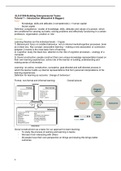Summary
Summary Building Entrepreneurial Teams (BET) - Tutorials & Guest Lectures (ELS-51306)
- Course
- Institution
Summary of all 5 tutorials (tutorial 1, 2, 4, 7 & 8), which discussed exam materials, and the 2 guest lectures (1: Tjerrie Smit, NN Group, 2: Martin Slot, De Groot & Slot). Does not contain tutorials 3, 5, and 6 because these were pitch tutorials. With this summary in combination with the literatur...
[Show more]



